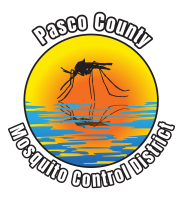Community Concerns
Q: Are ground and aerial mosquito control treatments harmful to people or pets?
A: When mosquito control treatments are applied according to label instructions by trained and licensed professionals, very low concentrations of US EPA-approved insecticides are used and they are not harmful to people, pets, or the environment. Our staff are licensed to apply these products through the Florida Department of Agriculture and Consumer Services and undergo continuing education training each year to ensure proper use and application in order to minimize potential risks to people, pets, and the environment.. These products are designed to break down quickly in the environment. While direct exposure may cause minor, temporary irritation in some sensitive individuals, they are not considered harmful to people, pets, or the environment under normal conditions.
Q: Will treatments harm bees or other wildlife?
A: Our mosquito control practices follow Integrated Mosquito Management principles that prioritize the safety of non-target species. Treatments are carefully timed and targeted to minimize impacts, for example, avoiding known beehive areas and conducting truck-based adulticide treatments at night when pollinators like bees are typically inside their hives and not out foraging or flying around.
Q: I have honey bees. Can I request special consideration during mosquito control treatments?
A: While PCMCD cannot guarantee exclusion from treatment areas, we strongly encourage all local beekeepers to register their apiaries with the Florida Department of Agriculture and Consumer Services (FDACS). This information helps us plan mosquito control efforts with greater care around known hive locations. Beekeepers are also encouraged to visit our website or sign up for notifications about scheduled treatments in their area, allowing time to take protective measures. Additionally, PCMCD conducts adulticide applications after sunset, when bees are typically in their hives, to help minimize any potential impact on pollinators.
Q: My neighbor has a stagnant pool. What can be done about it?
A: Stagnant pools can serve as mosquito breeding sites. With the property owner’s permission, we can inspect and treat the pool to help control mosquitoes. To report a stagnant pool, please contact Pasco County Code Enforcement at (727) 847-8171.
Q: I just saw an orange and charcoal helicopter flying low; is that you?
A: Yes, if you see a low-flying, orange and charcoal helicopter operating during the day, it’s most likely one of PCMCD’s aircraft. Our pilots fly at low altitudes and make steep agricultural-style turns to precisely target mosquito habitats while ensuring safe and effective treatments. These maneuvers are standard flight patterns for mosquito control applications and such operations help reduce mosquito populations in the designated treatment areas and protect public health.
Q: How do we ensure your ULV trucks provide effective mosquito control while minimizing noise and disturbance?
A: Our Ultra Low Volume (ULV) trucks use quiet, electric spray systems that produce a visible mist, along with LED flashing beacon lights for safety. Equipped with GPS and variable-rate spray technology, we monitor speed, location, and treatment status daily to ensure precise, efficient, and low environmental impact application.
Q: How soon after the ULV truck passes is it safe to go outside?
A: The products we apply from our Ultra Low Volume (ULV) trucks break down rapidly and do not leave harmful residues in the environment. For your safety and comfort, we recommend staying indoors for about 15 minutes during and immediately after the truck passes. Once the spray has settled and the truck has moved on, no further precautions are needed.
If you happen to be outside when our ULV trucks are operating, please make yourself visible to the driver, they are trained to switch off the spray system when they see pedestrians.
